Remembering Grandpa Harry: On November 1, 2005, the United Nations General Assembly designated January 27 - the anniversary of the 1945 liberation of Auschwitz - as International Holocaust Remembrance Day.
To mark the day, Abq Jew offers a true story - a portion of the extensive foundation story of his mechutan's (his son's father-in-law) family.
Abq Jew first heard the story a few years ago, when Cousin R. posted it on Facebook. Cousin R. learned the story from her father - and from Grandpa Harry's written testimony.
So. Who was Grandpa Harry? That's a story in itself! He was born in Berlin in 1907, studied law and classical philology, and earned his doctorate in 1929 at the University of Leipzig.
He then studied economics at the London School of Economics, to prepare himself for a job in the tobacco industry - his father [Great Grand Papa David] was a partner in the Reemtsma cigarette factories GmbH.
In 1940, four days after the German attack on the Netherlands in World War II, he and his family managed to escape to England.
Cousin R. strongly supports America's long tradition of birthright citizenship, which was then being questioned.
As for Abq Jew - he is still fixated (see April 2023's Hiding During the Holocaust) on the travails of Dutch Jews during World War II.
It's all connected.
1.
Cousin R. begins the story:
My paternal grandparents [Grandpa Harry and Grandma Claire] were born in Germany. When the Nazis came to power they stripped all Jews, my grandparents included, of their German citizenship, effectively rendering them stateless—citizens of no where.
My father’s family was very, very fortunate in that they had international connections because of my great grandfather’s business ties. My grandparents first went to England, where my Aunt C. was born. At that time, England had birthright citizenship and C., by virtue of her birth, was a British subject.The family then went to Holland, where my father and his younger sister were born. Holland didn’t have birthright citizenship. Children were whatever the citizenship of their parents were. But my grandparents had lost their German citizenship so my father and his little sister were stateless too.
In 1940, when C.was 5 and my father was 3, the Nazis invaded Holland.
2.
An historical refresher: Before May 10, 1940, the fundamental principle and profound hope of Dutch foreign policy was neutrality - as it had been for a century.
The Netherlands had avoided getting involved in World War I, and - in order to preserve their country's neutrality - the Dutch government had been careful not to take an official stand on the situation in Nazi Germany.
Nevertheless. In the early morning of May 10, 1940, Dutch observers saw bombers from the German Luftwaffe flying in the direction of the North Sea. They assumed that they were on their way to England. But once over sea, the planes made 180-degree turns and flew back to attack the Netherlands.
The Netherlands was at war.
3.
Here is how Grandpa Harry begins his story:
In the early hours of May 10th, 1940 - it is still dark - I am aroused by the thunder of gunfire and the booming of exploding bombs. It is shortly after 3 o'clock.
I can guess what has happened: rushing down and switching on the radio, I can hear the excited voice of the announcer giving the awful news of the German invasion.
It has come at last, what we had feared but refused to believe. I rush into my wife's room. She too has been wakened by the guns. "It has come!" She understands me. While the sun gradually climbs higher in a brilliant blue sky, we hurriedly don our clothes.
The children are still asleep. Am I dreaming all this? No - the loudspeaker keeps booming out the horrible truth.
Claire and I hold a council of war. There is terror in her eyes, but she is trying hard not to show it. Months ago we made our preparations: paltry enough, it is true, but all we could do.
A large handbag contains our jewellery, and, what is much more important, our papers.
What is man, and more especially a Jew, without papers? There they are, neatly stacked, certificates of birth and marriage, originals and photocopies and among them C.'s British passport.
4.
Cousin R. continues:
As [the German army] approached Amsterdam, where my father’s family lived, my grandparents frantically tried to flee. Forced to stay inside, because the Dutch considered them German, they struggled to at least save their children’s lives.The British sent a ship to evacuate British subjects. Because C. had a British passport, in a desperate attempt to save her children, my grandmother sent C. and my father with a neighbor to the British embassy.
She sent a 5 year old and a 3 year old to go with strangers to save their lives. Think about that.The neighbor returned with my father. He wasn’t British so they wouldn’t evacuate him.
“No one wants a stateless Jewish boy,” my grandfather would later write. No one protects you if you are stateless.
5.
Cousin R. concludes:
My grandparents and their youngest two children were eventually able to secure passage on the last ship of refugees leaving Holland.
The last ship of refugees to leave Holland before ports were closed - a few hours before the Netherlands surrendered - was the S.S. Bodegraven.
The ship left IJmuiden harbor on May 14, 1940, carrying about 250 refugees - including 74 Kindertransport children, rescued from an Amsterdam orphanage. After five days under attack from German aircraft, the ship finally reached Liverpool.
This was the last Kindertransport from the European continent.
Grandpa Harry's story does not end there - and Abq Jew has omitted many personal details and world events that make his story even more compelling.




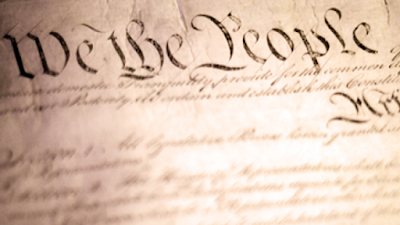
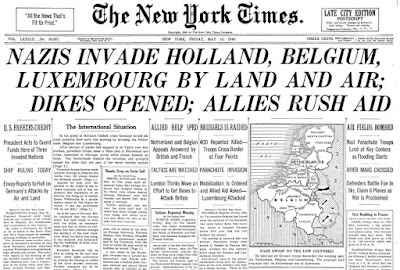
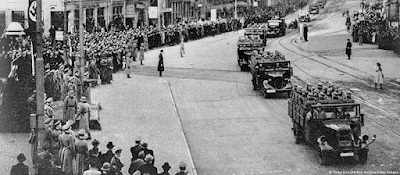
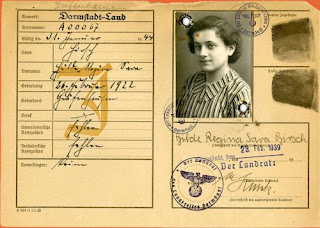

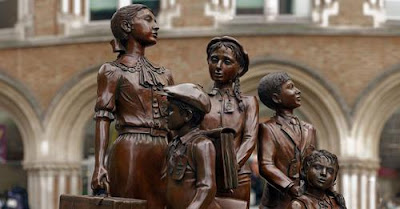

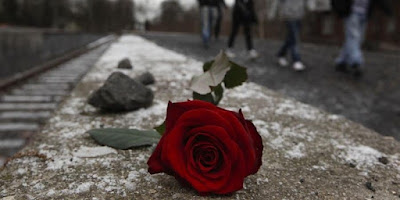
No comments:
Post a Comment